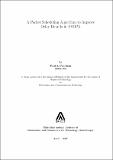Packet scheduling algorithm to improve delay bounds in HSDPA
Abstract
With tremendous growth in mobile subscribers in recent past and trend of accessing packet data services in wireless networks, 3GPP has introduced an enhancement to Universal Mobile Telecommunications System (UMTS) standard known as High Speed Downlink Packet Access (HSDPA) to provide high data rate services, especially in the downlink. The main focus of HSDPA concept is to increase peak data rates, improve Quality of Service (QoS) and enhance the spectral efficiency for downlink packet data traffic.
HSDPA introduces new transport channel named High Speed-Downlink Shared Channel (HS-DSCH) in downlink that is shared among the users accessing packet data services. Scheduling of these users is one of the most challenging and interesting problem because of constantly varying state of the wireless channel. The problem is even worse when users require certain level of QoS and the transmission rate supported by wireless channel is also varying.
The Exponential Scheduling Algorithm, proposed in literature, is a good candidate to provide bounded delays when QoS requirements are speci¯ed in terms of maximum tolerable delays, but the investigations in this thesis show that it fails to provide delay bounds when it is still possible with some trade-o® with system throughput and sometimes not even that.
The thesis proposes Delay Sense-Exponential Scheduling Algorithm, a variant of Exponential Scheduling Algorithm, to improve on the delay bounds provided by Exponential algorithm. The simulation results ensure that the new proposed algorithm improves on providing delay bounds to the Real Time (RT) services simultaneously providing comparable throughput to Non-Real Time (NRT) services. The proposed algorithm is studied under wide range of scenarios including NRT, RT and mixture of NRT and RT services.
Collections
- M Tech Dissertations [923]

